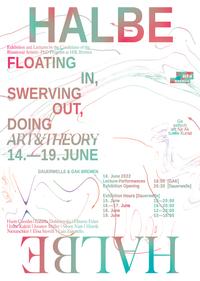Individual Project
Floating in, Swerving out, Doing Art and Theory
Exhibition and lecture-performances by the candidates of the Binational Artistic PhD Program at HfK Bremen. Lecture-performances are being held at the GAK Bremen on June 14 between 6 and 8 p.m. The vernissage starts at 8:30 p.m. on the ship Dauerwelle. The exhibition will take place from June 14 to 19, 2022.
Artists: Harm Coordes, Izabella Dobielewska, Elburuz Fidan, Irena Kukric, Joosten Müller, Shoey Nam, Henrik Nieratschker, Elisa Storelli, Luiz Zanotello.
By building on the convergence of practices that once were categorically divided, the Binational PhD in Art program at HfK cultivates artistic projects and research activities that transcend disciplines and encompass a combination of theoretical, artistic, applied, and technological elements. The artistic PhD Candidates at HfK Bremen are presenting their research in form of an exhibition and lecture-performances. In their practice, there is no deliberate differentiation between art and theory and, in using the term Halbe Halbe (“half and half”), the candidates share their research and insights by doing fluid acts, floating in and — willfully — swerving out. The diverse research positions in Halbe Halbe – Floating in, Swerving out, Doing Art and Theory display a rich combination, in which things simultaneously share similarities, interconnect with each other, and still maintain their exclusive uniqueness.
By looking into the abyss, Luiz Zanotello examines its relation to the “unknown” and defines its feelings of understanding time, something Elisa Storelli is also researching, along with the role of time’s communication, digital materiality, and the perception of missing memory, like the one that Elburuz Fidan gazes into with his archival material that produces a counter-knowledge through a Queer lens. On a landscape, Irena Kukric stages scenes for invisible actors and performance installations, similar to Izabella Dobielewska, who changes the centricity of the human while deconstructing our relationships with mountains on an intimate level. On a different plane, Harm Coordes creates experiences, using community building to research fashion practices that criticize neoliberal structures, somewhat like the capitalistic principles dismantled by Henrik Nieratschker in his occupation as an artist at the Warehouse, as well as through an analysis of digitalizing labor. A model that is different from the cell models that Joosten Müller researches while examining the changes in the historical course of how humans learn and proposing new didactical approaches to understanding our tiniest living parts. Together with the above-mentioned, all-over critical approaches and crises, Shoey Nam introduces the relevance of laughter as a possible survival solution in serious situations.
